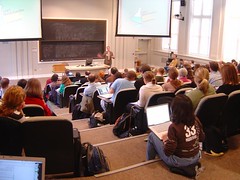 |
| The opening general session with gnome scientists, Hunt Willard. It’s an amazing lecture hall. Each seat has an electrical outlet and Ethernet port. The wireless was a bit weak, but plenty sufficient for blogging, as about half of the audience was doing. Visit a slide show of the conference here. |
It’s the next morning and I have only a couple of hours to catch up on e-mail before I head over to the airport for a two leg flight to Houston — and my brain feels sore. When I was young, I wanted to be a scientist. It didn’t matter what kind: astronomer, chemist, biologist. I didn’t major in science in college because I suspected that I wasn’t smart enough. after yesterday, I figure that those notions that prevented me from trying to become a scientist (like Johnny Quest’s father) were probably more on target than I even thought then. Yesterday’s Science Blogging Conference was full of REALLY smart people. Not only did it feature astronomers, chemists, biologists from one of the science centers of the world (Research Triangle Park and it’s surrounding Universities), but also the leaders of North Carolina’s blogging community. Add to all of that the fact that Brenda and I watched three episodes of The West Wing last night, and my brain is sore.
Yet, I feel that I had something to add for one very important reason. The issue of literacy came up again and again. As these scientists talked about why they blog or should blog, and why and how non-scientists should interact with the science world through blogs, a common conflict emerged again and again, the convergence of a dramatically new information landscape and generations who were taught to read books.
This conflict was most obvious in the Teaching Science session, where one Evolutionist of somewhere near my age (a rarity in Murphy Hall yesterday) claimed in so many words that the Internet was distroying knowledge, that it just can’t be trusted. A number of ideas were expressed including suggestions of a system of peer review of science content on the Internet by established scientists and a less formal DIGG-style recommendations program.
I threw out several rather shallow suggestions, still feeling not quite up to the high-brained banter, but finally blurted out, “This is an arms race that can’t be won.” It’s a technical problem, but there is no technical solution. The solution is to realize that we live in a dramatically different information environment, and as such, our notions of what it means to be literate must change. Being able to de-construct and evaluate the information that you find in this information environment is a skill that is no less critical today as being able to read the text. We have to teach students to be their own gatekeepers. It’s a BASIC skill”
It was a very good day, and this morning, while hitchhiking back to the conference, I found a blog by someone who attended the session on illustrating blogs. As you probably know, I make regular use of Flickr as a source of images for my blog. As a result of virtually visiting another session through the mind of someone elses blog, I’ve learned about:
Interestingly, that session seemed to evolve into a discussion of copyright and fair use, rather than how to use images. I suspect it’s the difference between going to a conference session wanting to learn one thing, and going to an un-conference sessions and ending out talking about something else.
Image Citation:
Blake, John. “NC Science Blogging Conference.” The Blake Slate’s Photostream. 21 Jan 2007. 21 Jan 2007 <http://www.flickr.com/photos/49503138762@N01/364179541/>.
Technorati Tags: warlick education science sciencebloggingconference

Hi Dave,
It has been a while since I commented on here…. Just wanted to thank you for your converage of the science blogging conference. I am looking at starting a project later this year with a group of schools blogging about a unit of science work. I hope to engage the science community in these students learning journey. Will let you know more as the project is developed. Thanks again… This has really helpped!!
Cheers,
Brett